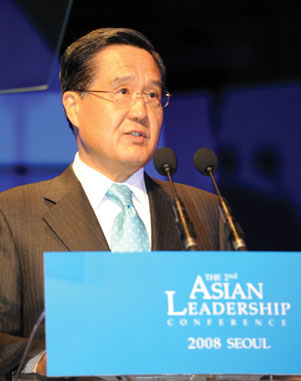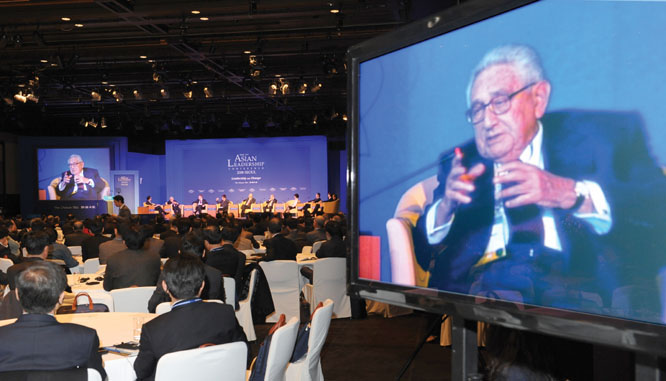Asian Leadership Conference
Discuss key topics on issues on Korea and regional cooperation
 The Chosun Ilbo, a leading morning daily in Korea, hosted the 2nd Asian Leadership Conference with the theme of Leadership and Change at the Shilla Hotel in downtown Seoul Feb. 21-22. The invited speakers, most of them former high government officials, distinguished business leaders and academics from around the world, made the event one of the most significant world forums held in Korea in recent years.
The Chosun Ilbo, a leading morning daily in Korea, hosted the 2nd Asian Leadership Conference with the theme of Leadership and Change at the Shilla Hotel in downtown Seoul Feb. 21-22. The invited speakers, most of them former high government officials, distinguished business leaders and academics from around the world, made the event one of the most significant world forums held in Korea in recent years.
President Bang Sang-hoon of the vernacular daily said in his welcoming speech that he and the newspaper take great pleasure in holding the conference with the participation of some of the most renowned leaders from around the world as the Chosun Ilbo celebrates its 88th anniversary this year.
He said the time has come for Asia. China, like a giant awakened from two centuries of sleep, has taken a great leap, emerging as the center of the world. India has also ended its long dormant period and joined the digital current and is now revolutionizing the service industry.
 Japan, the Asian economic superpower of the last century is now recovering from a prolonged recession.
Japan, the Asian economic superpower of the last century is now recovering from a prolonged recession.
Korea has also upgraded its economic status from one of the least advanced countries to the 10th largest economy in the world and faces a new era in hopes of playing an innovative leadership role for integration and practicality.
He said the leaders attending the conference, who have changed the history of their countries, have revealed their secrets for successful reform. Singapore's Senior Minister Goh Chok Tong delivered his nation from the Asian economic crisis and terrorist threats; former Prime Minister of Australia Paul Keating revolutionized the Australian economy by reforming its bureaucratic system; former New Zealand Prime Minister Jenny Shipley successfully guided her nation by downsizing the government, and former Chief Secretary of Administration of Hong Kong Anson Chan pushed for efficiency in government administration.
The paper also invited renowned business leaders to the event including Carlos Ghosn, CEO and President of Renault and Nissan; Stephen Green,
 Group Chairman of HSBC Holdings; Jim Rogers, author and chairman of Rogers Holdings and John Naisbitt, professor of Nakai University in China. Former U.S. Secretary of State Dr. Henry Kissinger also attended the conference as a featured speaker.
Group Chairman of HSBC Holdings; Jim Rogers, author and chairman of Rogers Holdings and John Naisbitt, professor of Nakai University in China. Former U.S. Secretary of State Dr. Henry Kissinger also attended the conference as a featured speaker.
The conference had seven sessions in its two-day meeting. The first one featured the theme of reform and current issues for Korea and included such speakers as Kissinger; Keating; Goh Chok Tong; Ichiro Ozawa, president of the Democratic Party in Japan; Stephen Green, group chairman of HSBC; Cho Suk-rae, chairman of the Federation of Korean Industries (FKI) with Dr. Il Sa-kong, chairman of the Institute of World Economics, as moderator.
The session dealt with the premise that President Lee Myung-bak faces a dynamic new Asia where four of the world's largest economies, China, Japan, India and Korea are located. Under the leadership of President Lee, Korea will try to take a giant leap to emerge as a technological powerhouse and trading giant with annual trade exceeding $1 trillion.
 Challenges for Korea will come from the increasing economic strength of China, which is expected to put much pressure on Korea's leadership in industrial sectors such as electronics, shipbuilding, steel and petrochemicals. Japan, also, is coming out of recession and seeking to re-emerge as a dominant leader in technology. Southeast Asia, where the race for market share among Korea, China and Japan is intensifying, will emerge as a trading battleground, with ASEAN countries signing free trade agreements bilaterally and collectively with the regional economic powers.
Challenges for Korea will come from the increasing economic strength of China, which is expected to put much pressure on Korea's leadership in industrial sectors such as electronics, shipbuilding, steel and petrochemicals. Japan, also, is coming out of recession and seeking to re-emerge as a dominant leader in technology. Southeast Asia, where the race for market share among Korea, China and Japan is intensifying, will emerge as a trading battleground, with ASEAN countries signing free trade agreements bilaterally and collectively with the regional economic powers.
If U.S.-North Korea relations are to be normalized, there will be public and political pressure within South Korea for a review of the U.S. military's role in Korea. With a new president installed in Washington in 2009, Korea's new President faces a serious diplomatic challenge.
The main subjects for the second session revolved around the theme "changes Facing Asian Companies in Globalization: Strategy and Leadership."In explaining the selection of subjects, the introductory statement said the 21st century has been labeled the "Asian Century."The tag has partially come from the rapid development of global Asian companies such as Toyota, Sony, Samsung, Hyundai and LG. To compete in the rapidly changing business environment, however, Asian companies need new strategies and leadership.
Emerging economies in Asia have been giving birth to a number of companies large enough to play major roles in the international business scene. They include brands like Tata, Reliance, and Lenovo from India and China. These companies have been increasingly asserting their presence not only in emerging markets, but also in the established markets of the United States and Europe.
The third session dealt with the subject of corporate social responsibility in the 21st century. A panel made up of CSR and NGO leaders and corporate executives searched for the definition for a new CSR standard in demand for the Asian business environment.
The fourth session'a main theme was new leadership to reform enterprises. The discussion revolved around the subject of the management of change and the development of leadership. The development of an able leader is a decisive factor in guiding members of an organization to overcome difficulties, including changes, so that they can be more responsible for what they do for their companies.
In the fifth session, the major subject of discussion was the future of China after the Beijing Olympics. China has made an outstanding economic leap forward in the past 25 years, but the world wonders if the country will be able to sustain its growth momentum. Will it be able to take care of various problems it faces such as energy, environmental, social and economic issues?
The sixth session was devoted to the future role of Japan in Asia, especially the direction of its relations with other Asian countries, largely with China and Korea. How would the country deal with some critical views among Asian countries for its close military alliance with the United States's The participants included Eiske Sakakibara, professor at Waseda University in Japan; Ken Calder, professor at Johns Hopkins University in the United States; Hwang Daui, professor at Renmin University in Beijing; Jim Rogers and the FKI's Cho.
"Make reforms instead of copying others," "Use many civilian sector experts,"and, "Achieve the denuclearization of North Korea,"were the most common pieces of advice that the participants, many of them leaders who changed the history of the world, offered to the new Korean government.
"Such advice will go a long way in the formation of policies by the new government,"said Dr. Il Sa-kong, the moderator of the first session of the conference and also the co-chairman of the special council for strengthening national competitiveness of the Presidential Transition Committee.
Dr. Kissinger, former U.S. secretary of state, warned that the failure of the six-party talks to denuclearize North Korea would lead to an arms race in North Asia with each country in the region seeking to develop nuclear arms, leading to conflicts in the region. He went on to note that the unification of the divided Koreas can be realized only when North Korea no longer has any nuclear weapons and development programs.
Chairman Ozawa of the Democratic Party of Japan called for the cooperation of China, Japan and Korea, saying that without a change in China's position, it would be very difficult to solve North Korea's nuclear issues. He said trust between Korea and Japan should lead to improved relations with China for peace in the Northeast Asian region.
Chairman Ozawa attracted a large amount of attention during the first session with his statement that he fears the collapse of communist rule in China as the stronger economic power becomes more susceptible to corruption. He warned that economic reform and opening cannot co-exist with a communist dictatorship. Long-term rule always ends up being corrupted, and the Chinese communist party won't be an exception, he warned. He continued that the deep chasm between the rich and the poor can lead to an abrupt explosion of violence as the poor can no longer endure their suffering. He also said China's neighboring countries are concerned with China's military build-up helped by the explosive growth of the Chinese economy. He called on China to show it is ready to make a contribution to the development of the human race with positive actions. Neighboring countries like Korea and Japan should help the Chinese government to make a soft-landing as their historic mission. nw
A group of VIPs invited to the Asian Leadership Conference including former U.S. Secretary of State Dr. Henry Kissinger, Goh Chok Tong, senior minister of Singapore, Ichiro Ozawa, president of the Democratic Party in Japan are engaged in talks during the conference.
(photod from left) President Lee Myung-bak addressing the Asian Leadeership 'conference held Feb.21-22 at Hotel Shilla in downtown Seoul. Chairman Bang Sang-hoon of the Chosun Ilbo, the host of the global event. A scene of the conference. Former U.S. Secretary of State Dr. Henry Kissinger on screen.
3Fl, 292-47, Shindang 6-dong, Chung-gu, Seoul, Korea 100-456
Tel : 82-2-2235-6114 / Fax : 82-2-2235-0799